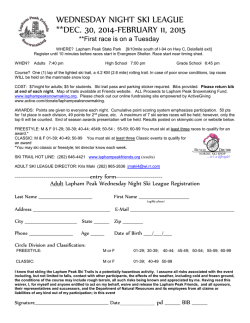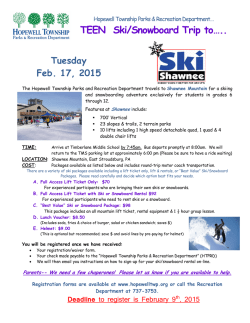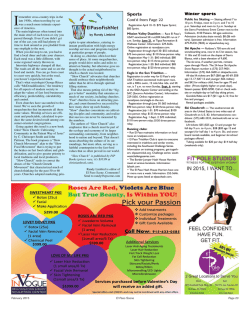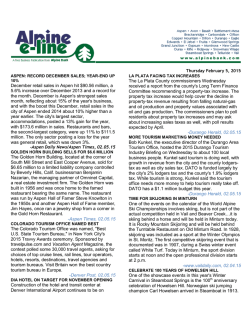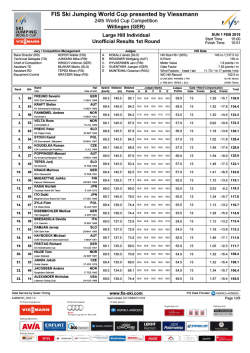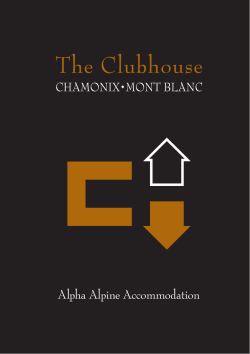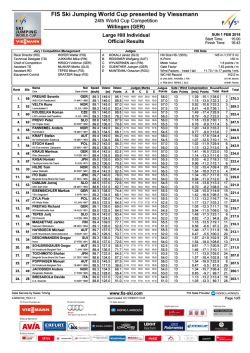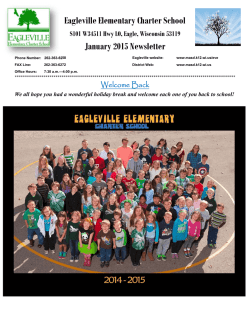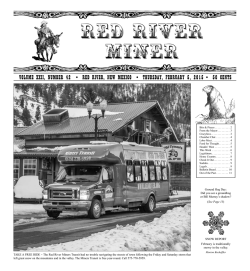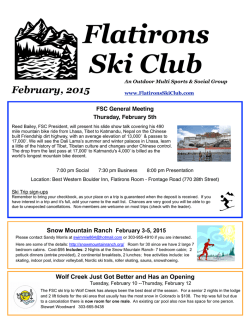
pre-trip dossier. - Wilderness Medical Training
Mountain Medicine on Skis 8-12 February 2015 - Chamonix Mountain Medicine on Skis - Chamonix 8th – 12th February 2015 Course Dossier – V1 Welcome to this exciting new course set in Europe’s premier skiing playground. This note will help you prepare or answer your questions if you are thinking about joining us. Be sure to check the website for details that are not included or repeated here especially about the ski standard required. http://wildernessmedicaltraining.co.uk/mountain-medon-skis and this special FAQs newsletter http://eepurl.com/-0Q25 If you have not already signed up for the course, always see the website for the latest information and to book and pay securely online. Registered delegates will be kept up to date directly by email. BUDGETTING The course fee covers instruction, some equipment on loan, tuition and 2 course books (WMT’s Medic manual and Staying Alive Offpiste). So you’ll also need to budget for: - Accommodation & meals, beers, drinks/snacks whilst skiing - Ski equipment rental, ski passes - Travel insurance - Flights and airport transfers TRAVEL Where to start? www.chamonix.com is a fantastic website for local information including pictures, webcams, accommodation options and more. www.chamonix.net is better for info about getting to Geneva and Chamonix, flight options from anywhere in the world, airport transfers and more. You need to fly into Geneva, Switzerland. Some scheduled UK flights to Geneva use www.skyscanner.net to search for you! Easyjet www.easyjet.com BMI Baby www.bmibaby.com 1 Mountain Medicine on Skis 8-12 February 2015 - Chamonix Jet2 www.jet2.com British Airways www.ba.com Swiss Air www.swiss.com Visas Full British, Irish or other EU passport holders don’t need a visa for Switzerland and/or France. Other passport holders should check. Airport Transfers – getting to Chamonix from Geneva airport WMT has a discount arrangement with www.mountaindropoffs.com – use code WMT01 (case sensitive) to get 10% off. They run a reliable and friendly shared mini-bus service, direct door to door. We strongly recommend you do not take the train from Geneva to Chamonix unless you want a protracted journey. The same goes for the scheduled coach that stops at different town en route (different from the minibus resort transfers). Visit this link for other transfer company options http://www.chamonix.net/english/transport/transfers.htm. Easybus is a new service run to a timetable (as opposed to meeting your flight) and has a central drop off and pickup point which is the main train station. http://www.easybus.co.uk/en/geneva-airport/geneva-to-from-chamonix Book early to get the cheapest fares (so they say). Shared apartment accommodation - Saturday 7 Feb – Friday 13th Feb We propose to accommodate delegates in shared town centre shared apartment with others on the course. We will book this from Saturday 7th February to Friday 13th February. We strongly urge you to arrive Saturday so you have a warm-up ski day on Sunday. Barry will also arrive late Saturday so he can meet students on Sunday morning to help with ski hire and join you for a day’s informal skiing. You will probably need to share a room (same sex only) and bathrooms. Budget £150 - £200 for this accommodation. The idea is to divide the total actual cost between the number of users with the aim of filling all the usable beds in each property. We will steer clear of budget apartments with pull out sofa beds and bunk beds unless there’s a demand for basic, cheaper accommodation. You should budget £150 - £200 for accommodation. We have good contacts in town to help us find and choose the most suitable and cost effective properties. Some properties may have single rooms and if so, we may, in fairness, apportion a slightly higher share of the cost if you request single occupancy. If you do not opt for a shared Chamonix apartment organised by WMT, please do not book accommodation outside of Chamonix. This will make it impossible to co-ordinate a meeting point and transportation each morning we will ski together. DAY 1 COURSE KICKOFF & FORMAL MEETING @ 1800 Sunday 8th February We will coordinate Sunday morning plans with delegates nearer the time. If you arrive Sunday, please be available to meet at 1800 at a town centre place to be confirmed. RESOURCES & USEFUL ADVICE Here’s a handy town & valley map http://www.chamonix.com/pdf/planVille.pdf 2 Mountain Medicine on Skis 8-12 February 2015 - Chamonix Other maps here including excellent virtual tours: http://www.chamonix.com/maps,14,en.html Insurance Make sure you are properly insured for guided on and off piste skiing including (potentially) glacier skiing. Bring your EHIC (European Health Insurance Card) with you, if applicable to your country of residence. Carre´ Neige insurance can be purchased with lift passes (but not online). It is very cheap – c. €2.80/day and covers rescue off the slopes and ski pass refunds, medical treatment and repatriation. It does not cover glacier skiing. Beware that the BMC (British Mountaineering Council) will consider this a “work” trip if you are being subsidised in any way or counting towards CPD and they won’t insure you. “Free” travel insurance from a bank or credit card often excludes snowsports. Snowcard insurers http://www.snowcard.co.uk/ UK residents only – Snowcard WILL insure our medics to come on this course even if you are being funded – they consider this non manual business travel – best to speak to them about your specific needs, cancellation cover required, duration of travel etc. Tel. 01295 660836. KIT LIST General advice: • Pack as you would for a normal ski holiday or ski touring trip. Apply your own experience. Please ask questions if you’re uncertain or are going to “splash the cash” to get new gear! • Dress in layers. A thick “Spyder-type” ski jacket is not a flexible garment. You will get warm “skinning” up • Don’t arrive Monday with new skis or boots you have never used before (or worse, have borrowed). Ski on Sunday before so you have that evening to sort out ill fitting boots or bindings. You will need: • balaclava/warm hat • ski helmet – very strongly recommended • thermals/fleece layers/ski socks • ski pants and jacket (preferably hooded) • ski gloves and/or mitts, thin liner gloves • sun glasses & ski goggles • sun block • ski pack – a 30L rucksack* You will also need to bring or rent: • ski boots • skis • poles (ideally with fat baskets which are better in powder and loose off piste snow) These items will be loaned to you – you are welcome to bring your own if you have them: • avalanche transceiver, shovel, probe 3 Mountain Medicine on Skis 8-12 February 2015 - Chamonix • • • crampons (must fit a ski boot) – might not be needed so leave out if tight on weight harness ice axe - only a short one – nothing over 60cms (unless you are particularly tall) – as with crampons * Everyday you will need to ski with water, snacks, goggles, shovel and a probe as a minimum. Some days you may also need skins, crampons, an axe and spare clothing. Therefore a proper ski pack is required. Choose a pack that you can lash skis on the back of, has compression straps for tightening the load, a comfortable, secure waist belt and shoulder straps and a chest strap. Any decent shop that sells skis should be able to advise you. Basically you need a pack suitable for a ski mountaineering day tour. Ski hire We will use our long-time snow sports partners Coqouz Sports in Chamonix - 306 Rue Paccard - west end of town, (open 0830 – 1930 Friday - Sunday) opposite Millet. WMT will co-ordinate your requirements with them. From the town centre/square, walk west, past Patagonia (on your left) and past Helly Hansen on your right. The shop is 50m further on the right. Most shops, including most ski hire shops will close for lunch usually from 1230 to 1430 or 1500, with some exceptions on weekends. Most shops are open until 1930. Coqouz is open all day on weekends. Ski Stations & Lift Passes There are 4 main lift stations in the Chamonix Valley. Most of the main skiing is higher, above 2000m. Brevent is above town and linked to Flegere (2 km up the valley). Grands Montets is 8 km up the valley and is the largest station, with access to a lot of off piste skiing and glacier skiing. Le Tour/Domain de Balme is furthest away (10 km) and fabulous (but under rated) for off piste and access to some great short ski tours. Les Houches is down the valley 4 km and is not included in the Chamonix Le Pass (but included in the Mont Blanc Pass) which is the domain most likely to be open during severe weather and high avalanche risk. Passes can be purchased at the Montenver train station in town and all lift stations (but not at the Tourist Office) and now online at www.compagniedumontblanc.fr but first you need to obtain a reusable hands-free electronic card. See this page for a full summary of ski pass options: http://www.compagniedumontblanc.fr/en/forfaits A daily ski pass costs between 48 and 58.50 euro BUT don’t buy ski passes in advance or multi-day passes on arrival. We may not decide where we will ski until each morning and the pass requirements may change as accordingly. Please wait for our advice. Chamonix lift stations use “hands free” electronic passes. These are reusable plastic cards (non-refundable €3) that can be recharged on line. 4 Mountain Medicine on Skis 8-12 February 2015 - Chamonix Helmets are highly recommended for piste and off piste skiing. Fewer people ski with a helmet when ski touring but this is becoming more common. Get fit – there’s still time! http://www.skiclub.co.uk/skiclub/infoandadvice/category.aspx?categoryID=11#.VJNZzXA Bs CPD credits For medics, we estimate this course is valid for at least 12 CPD credits. For more information on CPD please consult this webpage http://wildernessmedicaltraining.co.uk/accreditation-medic-courses Balance payments are due promptly 2 weeks before the course please. We will send you an email reminder with options to pay online via a secure payment link or by bank transfer. Communicating with other course delegates See who else is going and chat about pre-trip fitness, ski gear, life!: https://www.facebook.com/events/1580134015531585/ Weather and Snow Reports - www.chamonix.com Internet is available around town and there’s free Wi-Fi at McDonalds and the Tourist Office. Most rental apartments have free wifi. I hope this satisfies most of your queries. Please email any questions any time. You can expect periodic email updates. We hope you are looking forward to the course and we look forward to skiing with you. All the very best, Barry Roberts WMT Commercial Director [email protected] www.wildernessmedicaltraining.co.uk 5 Mountain Medicine on Skis 8-12 February 2015 - Chamonix TEACHING TEAM Dr Harvey Pynn, MA FCEM DMM (UIAA) DMCC DTM&H, WMT Medical Director Harvey is a Consultant in Emergency Medicine at Bristol Royal Infirmary and an Honorary Consultant in Pre-Hospital Emergency Care with Great Western Air Ambulance. He has undertaken several operational tours across the Middle East whilst serving in the Armed Forces. Harvey has completed more than 10 expeditions worldwide – mainly in mountain and jungle areas (both as leader and doctor). He holds the Mountain Leader award and is an ALS, APLS and BATLS Instructor. Harvey has particular interests in trauma, environmental and tropical medicine and has completed the diplomas in mountain medicine and medical care of catastrophes. He completed the diploma in tropical medicine in London in 2011. Amongst his many publications Harvey recently edited a chapter in the Oxford Handbook of Expedition and Wilderness Medicine. On the expedition front, in April 2010 Harvey completed the gruelling Marathon de Sables in Morocco for the charity Mencap and more recently took part in a medical research expedition to the Cordillera Real of the Bolivian Andes. Harvey was appointed WMT Medical Director in August 2013 after 10 years of teaching, developing and directing WMT courses. Barry Roberts BSc BEd, WMT Commercial Director Baz has maintained a long-standing interest in adventure and wilderness medicine since ski patrolling, climbing and leading canoe expeditions in Canada starting at 15. As a cofounder of WMT and has taught WMT courses for 24 years. He was a Director of Raleigh International and has 25+ diverse international expeditions under his belt, mostly as the leader, mainly to the mountains in East Africa, the Greater Ranges and Greenland, including 3 major ski touring expeditions. He is an advanced diver, paraglider pilot, skydiver (now retired), a qualified Day Skipper, ski instructor and ski mountaineer. He is the co-author of Staying Alive Off-piste, a contributing author to the OUP expedition medicine handbook (3 chapters) and author of many adventure magazine features. From ’04 to ’08 he was sponsored by The North Face. Expedition highlights include attempting Everest and the first winter ascent of the highest mountain in the Arctic (Gunnsbjornsfjeld in Greenland) from which he paraglided off. His most recent trip in Nov. ’14 was to north India where he paraglided along the fringes of the Himalaya and racked up 30 hours of airtime in 9 days flying with vultures, eagles and two mates. Luc Bellon – UIAGM Mountain Guide Luc is French and an internationally qualified high mountain guide and ski instructor with an extensive background in mountain rescue as a former mountain policeman with the PGHM. He has worked extensively with Barry Roberts running ski courses and corporate events in Chamonix and he has supported WMT’s Chamonix courses in summer and winter for the past 7 years. 6 Mountain Medicine on Skis 8-12 February 2015 - Chamonix Mountain Medicine on Skis Ski & Medical Programme Chamonix th 8 – 12th February 2015 Ski & mountain programme Day 1 – Informal warm up ski (optional), 6-8pm formal kick off – evening welcome chat, intros and medical lecture, gear check Day 2 – Polishing piste skiing skills; learning to flow, edge, ski with less effort, more grace, efficiency, speed and control, developing avalanche awareness, use of avalanche transceivers, victim search practice, medical training (see the Medical Programme) Day 3 – Transitioning to off piste skiing; techniques and tricks (first one is “less is more!”), choosing a safe line back-country, route planning, navigation, using GPS, using an ice axe, rope-work, snow anchors, crevasse rescue, medical training Day 4 – Introduction to using touring skis, looking after your skins, mastering the “kick turn”, practicing going up and down on a short ski tour, crampon use, medical training Day 5 – Final day – putting it all together – longer ski tour giving students more responsibility for trip planning and execution, teaching and coaching en route, medical training 7 Mountain Medicine on Skis 8-12 February 2015 - Chamonix Medical programme Day 1 – Evening tutorial; scene safety, triage and management of the injured casualty in the remote winter environment. We’ll delve into the physiology of trauma and the effect of the cold on the human body and techniques for mitigation will be discussed. Best practice pre-hospital and in hospital will be discussed. Day 2 – Mountain session; we will put the learning of the previous evening into practice with a medical scenario in the ‘field’ Evening; frost nip, frostbite and non-freezing cold injury seminar covering the latest research that has informed the most up to date medical practices and reduced the need for early surgery. Case studies will illuminate and reinforce the theory. Day 3 – Mountain session; triage practical in the avalanche setting Evening; altitude seminar delving into the pathophysiology of Acute Mountain Sickness, High Altitude Cerebral Oedema and High Altitude Pulmonary Oedema. Review of treatments and discussion of ascent profiles and risk mitigation. Practical use and demonstration of the portable hyperbaric chamber. Day 4 – Mountain session; femoral and pelvic fracture management, moving, lifting and carrying a seriously injured casualty improvising with the kit one would carry in the mountains Evening; hypothermia seminar in which we interrogate the ICAR guidelines and discuss the role of techniques such as ECMO (extra corporeal membrane oxygenation) Day 5 – Mountain session; we will combine mountain and medical skills to practically demonstrate how to care for a casualty for a more prolonged period in a hostile environment. Demonstration of snow scrapes, snow holes and other techniques. If time permits, we will discuss wilderness analgesia, management of eye problems at altitude and medical kits. The course handbook covers all of these extra topics and much more. With a smaller, more intimate course group, the instructors are available throughout to discuss anything of interest on the chairlift, slopes, classroom or after hours in the pub. 8
© Copyright 2026
